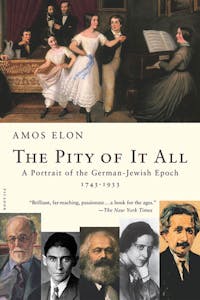The Pity of It All
A Portrait of the German-Jewish Epoch, 1743-1933
 Download image
Download image
ISBN10: 0312422814
ISBN13: 9780312422813
Trade Paperback
464 Pages
$22.99
CA$30.99
As it's usually told, the story of the German Jews starts at the end, with their tragic demise in Hitler's Reich. Now, in this important work of historical restoration, Amos Elon takes us back to the beginning, chronicling a 150-year period of achievement and integration that at its peak helped produce a golden age, second only to the Renaissance.
Elon shows how a persecuted clan of shopkeepers, cattle dealers, and wandering peddlers was transformed into a stunningly successful community of writers, entrepreneurs, poets, musicians, philosophers, scientists, publishers, and political activists—in many ways the flower of secular Europe. He peoples his account with dramatic figures: Moses Mendelssohn, who entered Berlin in 1743 through the gate reserved for Jews and cattle and went on to become "the German Socrates"; Heinrich Heine, Germany's beloved lyric poet who famously referred to baptism as the admission ticket to European culture; Hannah Arendt, whose flight from Berlin after an encounter with the Gestapo signaled the end of the so-called German-Jewish symbiosis. Elon traces how this minority, which was never more than one percent of Germany's population, ultimately came to be perceived as a deadly threat to national integrity and culture. But, as he demonstrates, this devastating outcome was uncertain almost until the end.
A collective biography, The Pity of It All summons up a splendid world and a dream of integration and tolerance that, despite its failure in Germany, remains the essential ennobling project of modernity.
Reviews
Praise for The Pity of It All
"Brilliant, far-reaching, passionate . . . A book for the ages."—The New York Times
"If there is one book Americans should read this winter, it is Amos Elon's The Pity of It All—a meticulous and wrenching history of a people in a place at a moment in time that bears urgently upon our own."—Joan Didion
"[He] is a master of the telling anecdote . . . One should be grateful for what Elon has done."—Los Angeles Times
"A work packed with beautifully sketched portraits, and constructed with a practiced eye for memorable, well-executed anecdotes."—The New York Times Book Review
"A tragic commemoration [and] a wonderful declaration of love for those German Jews whose emancipation coincided with the Enlightenment."—Die Zeit (Germany)
"Elon is a master storyteller. With the narrative skill of a novelist, he relates a compelling and ultimately tragic tale of the dazzling march of Germany's Jews from the impoverished, demeaning ghettos of the eighteenth century to the heights of commercial success and cultural expression, a record of achievement that Hitler sought to render null and void. But Elon wisely rejects the fallacious wisdom of hindsight and tells the story not from the perspective of its apocalyptic end, but from within the ambit of Jewish aspirations and the genuine possibilities that opened as Germany evolved into a modern nation. For Elon, the saga of German Jews is thus an intimate part of the social and political history of Germany. A tour-de-force."—Paul Mendes-Flohr, author of German Jews: A Dual Identity
"Provides fascinating insight into the Jewish dilemma of coping with modernity."—Frederic Krome, Jacob Rader Marcus Center of the American Jewish Archives, Cincinnati, Library Journal
"A superb account . . . Well-written, humane, full of learned asides and character sketches of figures such as Heinrich Heine, Else Lasker-Schüler, and Karl Kraus . . . A memorable evocation of a disappeared world."—Kirkus Reviews
"This meticulously researched history begins with the reign of Frederick II and ends with the rise of Adolf Hitler. According to the author, the German Jews—less than one percent of the population—never ceased in their efforts to merge German and Jewish identity. He cites their many contributions to literature, the arts, theology, politics, industry, and the natural sciences, and chronicles the lives of such eminent German Jews as Salman Schocken (founder of Schocken Books), poet Nachman Bialik, Nobel laureate Shmuel Agnon, Franz Kafka, Martin Buber, Gershom Scholem, Albert Einstein, and Moses Mendelssohn. Although their history is recounted as one in which—for most of the time—they suffered indignation and humiliation, culminating in the Holocaust, Elon writes: 'We must see the German Jews in the context of their time and, at the very least, appreciate their authenticity, the way they saw themselves and others, often with reason. For long periods, they had cause to believe in their ultimate integration. It was touch and go almost to the end.'"—George Cohen, Booklist
"In his excellent overview, veteran Israeli journalist and historian Elon (a biographer of Herzl and others) writes in a fluid and appealing style, with a talent for capturing the right anecdote or quote. He focuses on individual figures, both well-known ones such as Heine, Marx (both of whom converted to Protestantism) and Herzl, and lesser-knowns such as Ludwig Sonnemann (a newspaper editor who excoriated Bismarck's 1871 annexation of Alsace and Lorraine), Kurt Eisner (head of a short-lived socialist republic in Bavaria in 1919) and Walter Rathenau (the assimilated foreign minister who was assassinated in 1922). Like other historians of German Jewry, Elon points to the leadership of Jews in bringing the Enlightenment to Germany and to their high rate of assimilation and intermarriage (by the 1920s, the intermarriage rate of German Jewry rivaled that of America today). Fortunately, Elon avoids the trap of seeing all of pre-Nazi German-Jewish history as a prelude to the Holocaust or of viewing the 'Final Solution' as inevitable."—Publishers Weekly
Reviews from Goodreads
BOOK EXCERPTS
Read an Excerpt
From The Pity of It All:
Barely twenty-four years old, Heinrich Heine arrived in Berlin in the summer of 1821 to study law at the university and attend Hegel's seminar on aesthetics. Slight, pale, with dreamy blue eyes and long, wavy...


